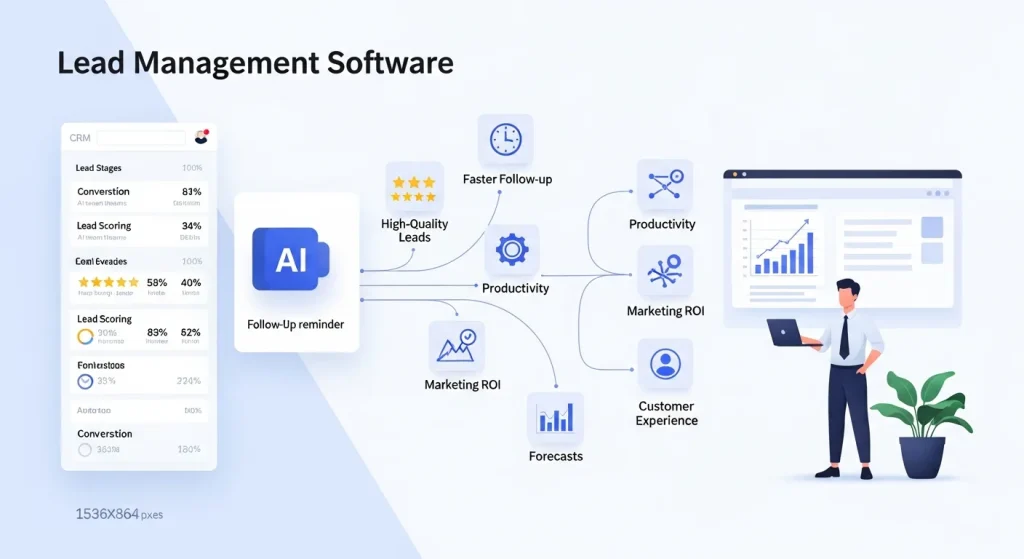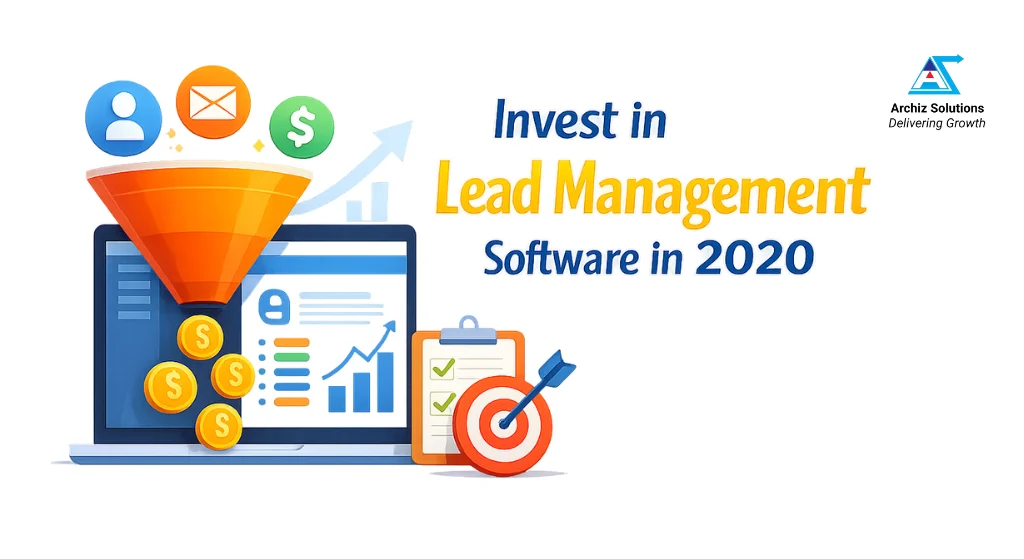Lead Management Software in 2025: Features, Benefits, AI Use Cases & Future Trends
The sales landscape in 2025 is drastically different from what it was a few years ago. Buyers are more knowledgeable, competition is fierce, and the timeline to convert a lead is shorter than it was a few years ago. Following up with leads, handling unstructured data, and communicating across different platforms do not work in our fast-paced digital economy without outdated sales techniques.
To adapt, businesses are leveraging Lead Management Software to evaluate potential buyers with an efficient technology to centralize every aspect of the sales process. From capturing prospective buyers at the top of the funnel to assessing a prospective buyer’s interaction, maintaining relationships, and closing a deal, lead management quickly centralises Sales and Marketing into a single intelligence hub.
What really sets modern systems apart is the deep inclusion of AI (Artificial Intelligence), lead management and CRM (Customer Relationship Management) automation. Historically, generic lead management systems have only stored contact information. This new generation of lead management platforms actually leverages ## artificial intelligence and predictive analytics ## to realize a lead score, the quality of leads, automate repetitive tasks, and a ne,w improved sales forecasting model.
Modern lead management systems have evolved beyond simple tracking — many now include an intelligent CRM assistant that automatically prioritises leads, triggers follow-ups, and provides actionable guidance so sales teams can work smarter and faster.
What is Lead Management Software in the year 2025?
Lead management software is an online application that enables companies to gather, monitor and oversee prospects through the sales process.
But in 2025, it is significantly more than that. With artificial intelligence (AI) built-in automation and integration with customer relationship management (CRM) tools, it means sales and marketing teams have one place to see every interaction with every lead, from their first visit to the website through their final purchase.
Key features:
Lead capture—automated leads collection from either site visits, an ad, a chatbot, or social media.
Lead tracking—track every touchpoint in the buyer’s journey in the digital sales funnel.
Lead nurturing—using AI-driven workflows that map messages to the buyer’s experience and send them at the optimal time to increase the likelihood of conversion.
Lead scoring—rank leads based on historical engagement and intent to purchase.
Analytics—determine campaign effectiveness and sales outcomes.
In conclusion, modern lead management systems allow you to take raw data and turn it into actionable and usable insights to help businesses produce repeatable and predictable sales growth.
Essential Components of Lead Management Software
1. AI Lead Scoring
Artificial Intelligence (AI) is transforming the way salespeople prioritize leads.
Instead of having a manual scoring system, AI in lead management software pulls data from engagement across channels like website visits, email opens, downloads and call notes to determine which leads are more likely to convert.
Outcome: The salesperson is now able to engage with a lead that has a better chance of buying, reducing time and increasing the close rate.
2. CRM Integration
Seamless CRM integration will provide the marketing and sales team with the same source of truth. Each lead’s every interaction (email, chat, call, or meeting) will be tracked automatically, providing a 360-degree view of the customer.
This eliminates data silos, enhances teaming, and provides alignment for consistent engagement along the digital sales funnel.
3. Automatically Nurturing Leads
Every successful sales process has some method of automation associated with it. Plain and simple, as long as a company is using lead management software, they can develop automated workflows to do things like:
- Send follow-up messages
- Assign tasks to teammates
- Put leads through stages automatically
- This allows for every lead to receive timely and relevant information – this builds engagement and trust.
4. Analyzing and Reporting in Real-Time
Modern lead management platforms have great dashboards that summarize your campaign and sales team performance with the push of a button.
You can track:
- Conversion rates for each channel
- Response rates
- Pipeline velocity
- Performance of individual sales reps
All of this allows the manager to make smarter and faster decisions, and to continuously be better in their sales approach.
5. Lead Capture across Multiple Channels
By 2025, every consumer exists on many platforms, which means websites, the use of chatbots, ads, and now social media.
A complete lead tracking system can capture all of these interactions and bring everything together on a single dashboard. No lead should ever be lost with any lead management process.

The Importance of Lead Management Software for Sales Growth
They say businesses with lead management software see significant leaps in revenue, revenue growth and profitability and here’s how:
1. Faster Follow-up
To improve responsiveness and reduce manual bottlenecks, some platforms also integrate voicebot-enabled features — automated voice interactions that handle reminders, routine queries, and even initial follow-up calls without human intervention.
2. Quality of Leads
Utilizing the AI capabilities for lead scoring, the sales team has the ability to concentrate their efforts exclusively on the best leads, which will produce greater efficiencies towards outreach productivity and wins.
3. Productivity
The accuracy of automating processes is said to reduce manual activities by over 50%. This allows sales professionals to spend their time developing relationships and closing business to enable more growth than with prior processes.
4. ROI on Marketing Campaigns
Integrated analytics allow businesses to determine what channels and campaigns have yielded the highest quality lead,s which is crucial for being efficient with marketing dollars spent.
5. Better Forecasting
Utilizing CRM databases helps with better accuracy in forecasting the pipeline, which can help organization develop more repeatable goals, as well as best optimizations of pipeline funding resources based on more solid forecasted information.
6. Enhanced Customer Experience
Modern lead tracking systems don’t just help sales — they also improve customer satisfaction. By tracking every interaction across multiple touchpoints (email, social media, chat, calls), businesses can deliver timely, personalized communication. This builds trust, strengthens brand loyalty, and improves long-term retention rates.
Example of AI in lead management in practice
Let’s assume a mid-sized B2B tech company engaged an AI-based lead management system in early 2024 before the use of the system:
- Average response times were 10 hours.
- Sales reps were spending 30% of their day on manual data entry.
- Conversion rates were around 12%.
- after the use of the new system:
- Response times dropped to 1 hour.
- Conversion rates improved to 25%.
- Staff productivity improved by 40% among the existing staff.
The organization achieved an immediate ROI from automating activities, improved lead scoring accuracy, and the sync of data across departments.
The organization now clearly shows that analytics powered by AI and automation are no longer optional in sales operations
Future Trends in Lead Management Software (2025 and Beyond)
1. Predictive Lead Scoring 2.0.
With machine learning algorithms, predictive insights into buyer intent can be developed before even the first sales call, allowing for hyper-personalized outreach.
2. Smart Workflows.
Seamless CRM integration will provide the marketing and sales team with the same source of truth. Each lead’s every interaction (email, chat, call, or meeting) will be tracked automatically, providing a 360-degree view of the customer.
This eliminates data silos, enhances teaming, and provides alignment for consistent engagement along the digital sales funnel.
3. Conversational AI.
Chatbots and voice assistants will help service lead qualification at the bottom of the funnel, allowing for instantaneous response time and 24/7 availability.
4. Deep CRM Integration.
In the future, software will be deeply integrated with marketing automation, customer support, and analytics to create a 360° view of where customers are in their journey.
5. Mobile-First Design.
Sales professionals in the field will be able to manage an entire pipeline through a mobile device with AI recommendations produced in real time.
This future technology will be lead management software for companies trying to improve and strengthen their competitive advantage.
Conclusion
By 2025, Lead Management Software will be more than an integration to your CRM – it will be your engine for driving long-term sales growth.
By deploying AI with automated sales and integrated CRM for lead management, companies can develop efficiencies, make dramatic improvements, and establish data-driven sales organisations at a pace that will seem effortless.
For both start-ups and enterprise organisations, a modern lead-tracking platform will not be a consideration – it will be an essential.
When these capabilities are part of an autonomous CRM platform — an autonomous CRM system that anticipates tasks and automates workflows — the software becomes proactive, helping businesses stay ahead of missed opportunities and manual delays.
Frequently Asked Questions (Faqs)
Q1.What is Lead Management Software?
Lead Management Software is a software application that captures and tracks leads, organizes them as they move through the sales funnel, and automates communication and reporting.
Q2.In what ways can AI help support lead management?
AI can assist marketers with prioritization of leads, help with automatic follow-up messaging and predictions on the people who will more likely convert, providing more accuracy and efficiency.
Q3.Why is CRM integration important?
CRM integration helps hold all customer information and communication in one place, so the marketer and salesperson are aligned.
Q4.How does a digital sales funnel create advantages?
The funnel mimics the buyer’s journey, automating the sending of the right message at the right time for the best chances to convert.


Hello, First of all, I would like to say that you wrote a nice article. Its true lead management software helps organization to treat their lead equally. Each lead is big opportunity for any organization. In such a case unable to give them equal attention can bring you to lose of a great opportunity.